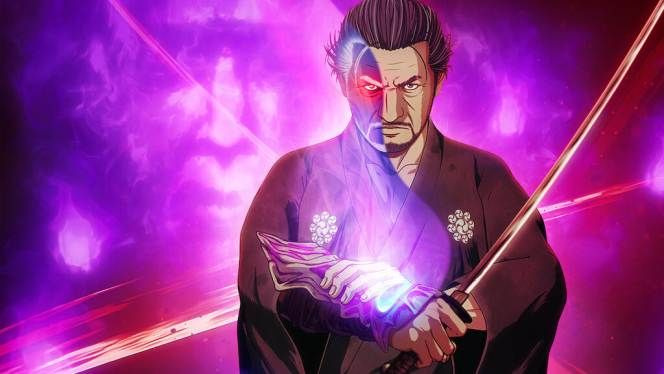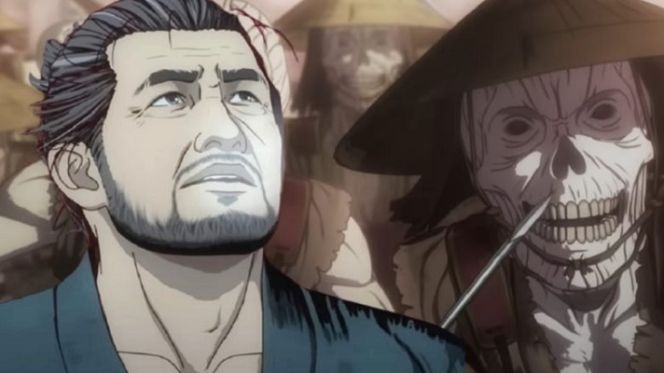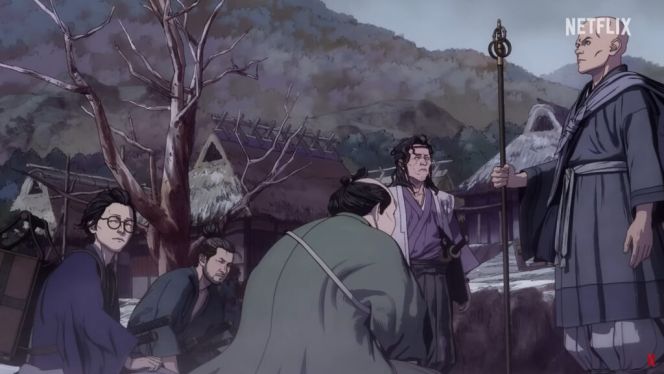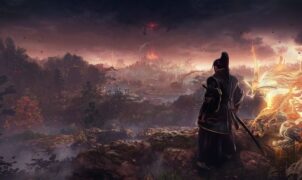SERIES REVIEW – “Onimusha Season 1” merges historical drama with supernatural flair under Takashi Miike’s direction, creating a blood-spattered canvas that indulges in action over articulation. Its animation, a contentious blend of 2D and 3D, sometimes harmonizes, sometimes clashes, detracting from the narrative cohesion. Despite its aesthetic inconsistencies, the series delivers a visceral samurai experience that captures the essence of the Capcom classic, albeit with less polish than its gaming inspiration.
“Onimusha Season 1” kicks off with a promise of merging history with horror, a concoction that has proven potent in the hands of Netflix’s recent video game adaptations. Set during the Sengoku period, it introduces us to a grizzled Miyamoto Musashi, whose weary demeanor belies the fierce warrior within. Toshihiro Mifune’s likeness is not merely a visual homage but an attempt to root the fantastical narrative in a semblance of cinematic realism. Musashi’s journey is a lonely one, punctuated by the clashing of swords and the spilling of demonic blood.
Masterful action sequences
The action sequences, masterfully choreographed, are the heartbeats of this show. Each stroke of Musashi’s blade is a verse in a violent poem, the choreography echoing the games’ own rhythm. These moments are where the series truly shines, where the mix of 2D and 3D animation feels justified, enhancing the dynamic and brutal combat that fans would expect from the Onimusha franchise.
Yet, it’s between these beats that the show falters, in the quiet moments where the animation should be allowing characters to breathe, to express subtle emotions – it’s here the 3D renders feel awkward, less expressive, and at times, unnecessary. The inconsistency of this choice is echoed in reviews, where the blend of art styles seems less an artistic decision and more an experiment without clear direction. The 2D art, detailed and evocative, seems suffocated when wedded to its less refined 3D counterpart.
Narratively, the show threads familiar tropes through its episodes – the grizzled hero, the relentless pursuit of demons, and the quest for inner peace amidst external chaos. While these themes are not new, they are comfortingly familiar, a base upon which the show could have built something more profound. Yet, the series often opts for spectacle over depth, for the roar of battle over the whisper of character development. It’s a choice that will divide audiences – some will find it a thrilling ride, others a missed opportunity for richer storytelling.
Top notch voice acting
The voice acting is a highlight, with performances that add gravitas to the characters, elevating them above the sometimes-clunky dialogue. The soundtrack, too, deserves mention – it’s a stirring backdrop to Musashi’s journey, a mix of traditional Japanese instrumentation and modern rhythms that encapsulates the show’s blend of old and new.
As a package, “Onimusha Season 1” is a mixed bag. It’s a nostalgic nod to the game series that will satisfy many fans with its faithful adaptation of the game’s aesthetic and action. But as a standalone anime, it struggles to define itself, to offer a narrative as compelling as its visuals are striking.
In the pantheon of video game adaptations, “Onimusha” will not stand as the pinnacle. Yet, it does not fall to the depths of obscurity either. It is a solid entry, a testament to the potential of such adaptations when they dare to embrace their source material fully. One can only hope that with a potential second season, the series will refine its visual approach, deepen its narrative, and deliver on the promise glimpsed in its bloodiest, most beautiful moments.
The series’ approach to its source material is commendable; it does not shy away from the game’s more fantastical elements, nor does it dilute its mature themes. The demons Musashi battles are not just physically imposing but are also manifestations of the internal struggle he endures. This duality of conflict, both internal and external, is a thematic thread that weaves through the narrative, though it could have been given more depth and nuance.
Where the series could have taken a deeper dive is in its character development. Musashi, as the centerpiece, is given ample backstory and motivation, but supporting characters often feel like mere set pieces, their potential for enriching the story untapped. The relationships and interactions that could have provided emotional weight are, at times, overshadowed by the next impending battle. This imbalance is not unique to “Onimusha,” but it is a pitfall that many action-centric series fall into.
Cinematic 3D animation in battles vs. lacking other 2D scenes and jarring transitions
The visual style, which has been a focal point of much criticism, is indeed a double-edged sword. On one hand, the 3D animation brings a cinematic quality to the battle scenes, giving them a weight and impact that 2D animation alone might not achieve. On the other, the transitions between styles can be jarring, pulling the viewer out of the experience rather than immersing them further. It’s a stylistic gamble that pays off in places but also costs dearly in others, particularly in scenes where the emotional resonance is crucial.
The series’ pacing is relentless, which is both a strength and a weakness. The quick succession of action scenes ensures that there’s never a dull moment, but it also means there’s little room for reflection or anticipation to build. The narrative moves at such a pace that the gravity of Musashi’s quest can feel diminished, its epic scope reduced to a series of battles strung together with minimal downtime.
Despite these criticisms, it’s essential to acknowledge what “Onimusha” gets right. Its commitment to delivering a samurai story steeped in supernatural elements is unwavering, and when it hits the mark, it does so with a force that is memorable. The action is visceral and well-executed, the art, when not conflicted by style shifts, is stunning, and there’s an undeniable charm in its straightforward storytelling.
In conclusion, “Onimusha Season 1” is an ambitious attempt to bring a beloved video game series to the screen. It stumbles in its execution, with visual and narrative inconsistencies that cannot be overlooked. Yet, it also strides forward with confidence in the areas it excels: action, atmosphere, and a faithful adherence to the game’s spirit.
-BadSector-
Onimusha S1
Direction - 7.2
Acting - 7.8
Story - 7.4
Visuels - 7.5
Ambience - 7.8
7.5
GOOD
"Onimusha Season 1" delivers a spectacle of samurai action and supernatural intrigue, skillfully blending game-inspired choreography with a cinematic narrative under Miike's direction. The series triumphs in its action and voice performances, although it grapples with inconsistent animation and underdeveloped characters. It stands as a solid if not groundbreaking, adaptation, scoring well in key areas and promising potential for its next iteration.














![[TGA 2025] Star Wars: Galactic Racer Focuses on High-Stakes Podrace Runs [VIDEO]](https://thegeek.games/wp-content/uploads/2025/12/theGeek-Star-Wars-Galactic-Racer-300x365.jpg)



Leave a Reply